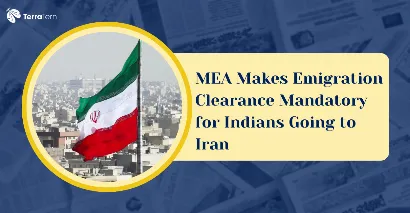Key Highlights
The Ministry of External Affairs (MEA) has removed the age-old exemption for Indians visiting Iran, and emigration clearance is now obligatory for all Indian citizens intending to be employed in Iran. The policy change is significant and replaces a 19-year-old exemption since December 2006.
Key Policy Changes Take Effect
In an official notification, the MEA stated on August 26, 2025, that it would revoke the exemption provided under notification S.O. 2161(E) dated December 28, 2006. The ministry used the necessity to protect and secure the interests of citizens of India who travel to Iran as the primary motive for the change in the policy.
These new rules are covered by the Emigration Act of 1983 in Section 41(1), which gives the Central Government the power to place emigration clearance requirements on countries. This is a turnaround in that the Indian citizens intending to work in Iran must seek proper emigration clearance with the Protector General of Emigrants before proceeding.
Also Read: India's New Emigration Bill: Modernising Overseas Employment
Understanding Emigration Clearance Requirements
This section provides all details on emigration clearance requirements
Who Needs Clearance
The new policy will directly address the Indian nationals who use ECR (Emigration Cheque Required) passports and are visiting Iran to work. ECR passports are generally issued to those whose educational backgrounds are not above matriculation level.
Current ECR Countries
Iran joins the list of 17 ECR countries that require emigration clearance for Indian workers, which includes:
|
Region |
Countries |
|
Middle East |
Bahrain, Iraq, Jordan, Kuwait, Lebanon, Oman, Qatar, Saudi Arabia, Syria, UAE, Yemen |
|
Asia-Pacific |
Afghanistan, Indonesia, Malaysia, Thailand |
|
Africa |
Libya, Sudan |
Document Requirements for Iran Employment
Indian citizens seeking employment in Iran must now prepare the following documentation:
For Individual Applications
-
Valid passport with a minimum of six months' validity
-
Employment visa for Iran
-
Employment contract from an Iranian employer
-
Insurance policy from an IRDA-registered company
-
Fee payment challan
-
Educational certificates
Also Read: 4300 Millionaires To Leave India, Mass Emigration Expected
For Applications Through Recruiting Agents
Recruiting agents must provide additional documentation, including:
|
Document Type |
Requirements |
|
Employment Contract |
Original contract attested by the Indian Mission |
|
Demand Letter |
From a foreign employer |
|
Power of Attorney |
From a foreign employer |
|
Insurance |
Pravasi Bharatiya Bima Yojana coverage |
Timeline and Implementation
The policy change took effect on August 26, 2025. The Protector General of Emigrants is supposed to publish substantial implementation guidelines and timelines for processing soon.
Processing Framework
The applications for emigration clearance are usually paid on the same day at the Protector of Emigrants (POE) offices in India. The streamlined process provides little time wastage for former job applicants.
Background: India-Iran Relations Context
This policy change is in the context of recent tensions in the region. In June 2025, the Indian government organised Operation Sindhu to rescue the trapped Indian nationals in Iran and Israel amid conflicts in the area. This operation successfully evacuated 3,597 Indian nationals in Iran from the greater evacuation.
Before this, the MEA had been keeping a 24/7 control room and had even issued travel advisories in the Iran-Israel region, which shows that there were already security issues that may have informed this policy decision.
Impact on Indian Workers
This section covers how this change impacts Indian workers:
Enhanced Protection Measures
The new emigration clearance measure will offer more control and ensure the safety of Indian employees in Iran. This includes:
-
Verification of employment contracts
-
Working conditions and salary standard.
-
Insurance coverage requirements
-
Grievance redressal mechanisms
Industry Response
The policy change especially impacts Indian semi-skilled and unskilled workers, since their traditional employment has entered Iran's construction, manufacturing, and service sectors.
Comparison: Iran vs Other ECR Countries
|
Country Status |
Clearance Required |
Exemption Period |
|
Iran (Before 2025) |
No |
December 2006 - August 2025 |
|
Iran (After 2025) |
Yes |
N/A |
|
Other ECR Countries |
Yes |
No exemptions |
This was the only policy reversal in response to the Iranian exemption of ECR countries, and this policy was significant, especially to expatriates in India.
Also Read: UAE Visa Check: Fast, Secure, and Hassle-Free Status
Processing Centres and Contact Information
Indian citizens can apply for emigration clearance at the following POE offices:
-
New Delhi
-
Mumbai
-
Chennai
-
Kolkata
-
Hyderabad
-
Kochi
-
Chandigarh
Each office provides same-day processing for individual applications and group clearances.
Conclusion
The requirement of Indian emigrants to obtain clearance to visit Iran is a significant policy change that emphasises the protection of workers at the expense of thousands of job seekers. This ruling of MEA indicates the increased focus on the welfare of citizens toward the outside countries, especially in areas with geopolitical friction.
Though introducing procedural steps, the new requirements tend to provide the Indian workers with the right procedural cover and the ability to have support mechanisms through official means. With implementation-specifics available, future emigrant can plan to carry the documentation and include processing time in their travel schedule. Contact TerraTern for more information!








